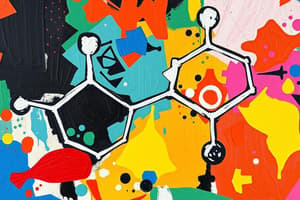Podcast
Questions and Answers
Which of the following reactions is primarily used to synthesize alkenes from alkanes?
Which of the following reactions is primarily used to synthesize alkenes from alkanes?
- Dehydrogenation (correct)
- Hydrogenation
- Polymerization
- Electrophilic addition
What is the main characteristic of alkadienes compared to alkenes?
What is the main characteristic of alkadienes compared to alkenes?
- They contain only single bonds.
- They possess more than one double bond. (correct)
- They are more saturated than alkenes.
- They contain at least one triple bond.
Which process is generally NOT a common method for synthesizing arenes?
Which process is generally NOT a common method for synthesizing arenes?
- Friedel-Crafts alkylation
- Hydrogenation of cycloalkenes (correct)
- Electrophilic aromatic substitution
- Dehydrocyclization
Alkynes can be synthesized from which of the following starting materials?
Alkynes can be synthesized from which of the following starting materials?
Which type of compound is characterized by having at least one triple bond in its structure?
Which type of compound is characterized by having at least one triple bond in its structure?
What is a common reagent used in the conversion of alkenes to alkanes through hydrogenation?
What is a common reagent used in the conversion of alkenes to alkanes through hydrogenation?
Which reaction condition is required for the dehydrohalogenation of alkyl halides to form alkenes?
Which reaction condition is required for the dehydrohalogenation of alkyl halides to form alkenes?
In the synthesis of alkadienes, which reagent is often used for the elimination reaction from known alkenes?
In the synthesis of alkadienes, which reagent is often used for the elimination reaction from known alkenes?
What is the main reaction condition for the conversion of aromatic compounds to alkenes through reduction?
What is the main reaction condition for the conversion of aromatic compounds to alkenes through reduction?
Which method is effective for synthesizing arenes from alkynes?
Which method is effective for synthesizing arenes from alkynes?
Study Notes
Synthesis of Alkenes
- Alkenes are primarily synthesized from alkanes through dehydrogenation, a reaction where hydrogen is removed from saturated hydrocarbons (alkanes).
Characteristics of Alkadienes
- Alkadienes contain two double bonds within their hydrocarbon structure, distinguishing them from alkenes, which have only one double bond.
Synthesis of Arenes
- Hydrocarbon cracking is generally NOT a common method for synthesizing arenes; arenes are typically derived from other processes such as aromatic substitution or cyclization.
Synthesis of Alkynes
- Alkynes can be synthesized from various precursors, including alkenes through a reaction known as dehydrohalogenation or dehydrogenation.
Compounds with Triple Bonds
- Compounds that contain at least one triple bond in their structure are categorized as alkynes, which are unsaturated hydrocarbons.
Synthesis of Alkanes
- Alkanes are saturated hydrocarbons with single carbon-carbon bonds.
- The primary methods of synthesis include:
- Hydrogenation of Alkenes and Alkynes: Requires hydrogen gas (H₂) and a metal catalyst (e.g., Pd, Pt, Ni) under high pressure and temperature.
- Wurtz Reaction: Reacting alkyl halides (R-X) with sodium in dry ether results in higher alkanes; carried out at room temperature.
- Decarboxylation of Carboxylic Acids: Heating sodium salt of carboxylic acids with soda lime (NaOH + CaO) produces alkanes.
Synthesis of Alkenes
- Alkenes are unsaturated hydrocarbons containing at least one double bond.
- Common synthesis methods include:
- Dehydration of Alcohols: Heating alcohols (R-OH) with acid (like H₂SO₄) leads to alkenes; requires high temperature and catalytic conditions.
- Dehydrohalogenation: Alkyl halides (R-X) eliminate hydrogen halide (HX) when treated with a strong base (e.g., KOH) at elevated temperatures.
- Cracking: Thermal or catalytic breakdown of larger hydrocarbons into smaller alkenes; done at high temperatures.
Synthesis of Alkynes
- Alkynes feature at least one triple bond in their structure.
- Synthesis techniques vary:
- Dehydrohalogenation of Dihalides: Treatment of vicinal or geminal dihalides (R-CHX-CHX-R) with strong bases at high temperatures yields alkynes.
- Acetylide Ion Formation: Reacting alkynes with strong bases (e.g., NaNH₂) creates acetylide anions, which can be used to form new C-C bonds.
- Lithium Amide (LiNH₂) with Alkyl Halides: This reaction facilitates the synthesis via nucleophilic substitution.
Synthesis of Alkadienes
- Alkadienes contain two double bonds.
- Common methods of synthesis include:
- Dehydrohalogenation Reactions: Similar to alkenes, but require a precursor molecule with two halogen substituents.
- Diels-Alder Reaction: A [4+2] cycloaddition of a diene and a dienophile under heating.
- Polymerization of Alkenes: Under specific conditions, many alkenes can be polymerized to create long-chain dienes.
Synthesis of Arenes
- Arenes are aromatic hydrocarbons characterized by their ring structure and delocalized π electrons.
- Synthesis routes include:
- Friedel-Crafts Alkylation: Treatment of an aromatic compound with an alkyl halide (R-X) in the presence of a Lewis acid (e.g., AlCl₃).
- Diels-Alder Reaction: Arene synthesis through cycloaddition reactions makes this versatile for constructing aromatic systems.
- Aromatic Substitution Reactions: Replacing a hydrogen atom with functional groups via electrophilic aromatic substitution, requiring catalysts or specific reaction conditions to favor desired products.
Key Reaction Conditions
- Temperature and pressure often dictate the success of reactions, with higher temperatures favoring endothermic processes.
- Catalysts play a crucial role in increasing reaction rates and specificity.
- Solvent choice can influence solubility and reaction mechanisms, making it vital for synthetic planning.
Studying That Suits You
Use AI to generate personalized quizzes and flashcards to suit your learning preferences.
Description
Test your knowledge on the synthesis of various hydrocarbons including alkanes, alkenes, alkynes, alkadienes, and arenes. This quiz explores the methods of synthesis and key characteristics of these compounds. Perfect for students studying organic chemistry.




